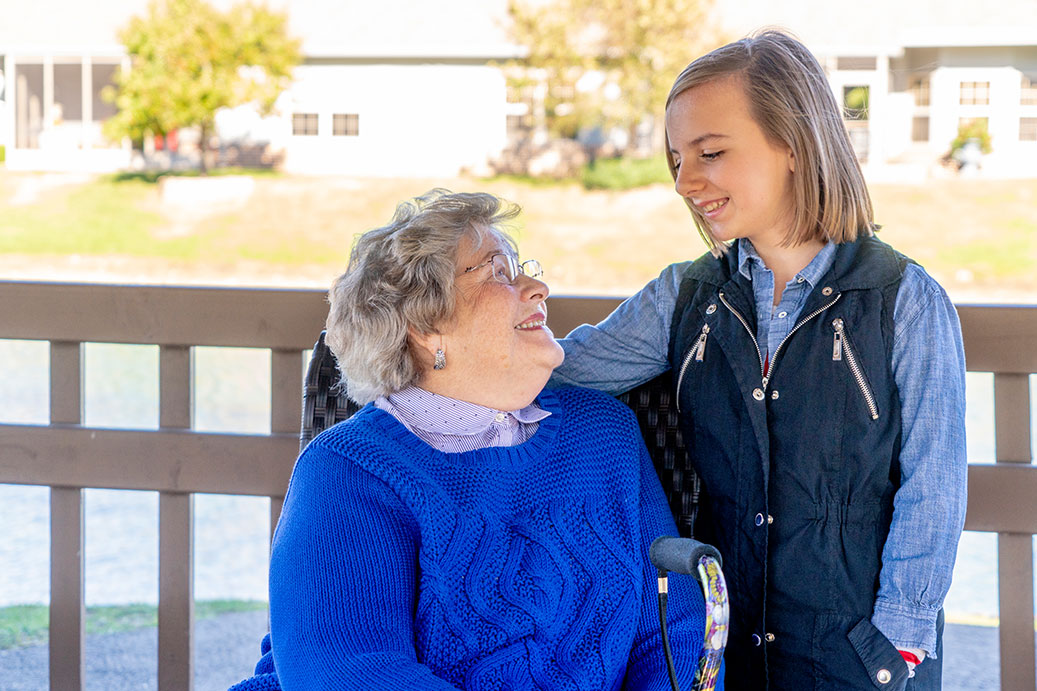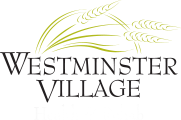
Is it time for a talk about senior living?
If you’re worried about a parent or loved one living alone, these resources may help you talk to and advise your parents. Explore our FAQs, glossary of terms and helpful links. We even provide info about our Westminster Village financial options and a cost calculator.
Retirement Community FAQs
For quick answers, consult our FAQs.
When is the right time for my parents to move into a retirement community?
The best time to move to any retirement community is when residents are still active and in good health. Westminster Village is the perfect choice for anyone who desires to continue the lifestyle they’ve come to love and also enjoy the reassurance of on-site care if needed. This exceptional lifestyle will offer your loved ones the time and opportunities to discover new talents and make new friends.
How can I help my parents transition to a retirement community?
AARP suggests an adult child ask his or her parents questions that might help start the conversation. You would not ask all these questions in one sitting, but use them as a guide for topics of conversation when the time is right. A few examples: Is your home still appropriate for your needs? Are there stairs or security issues? Do you need help with household chores? Can you cook your favorite meals? Hear the doorbell ring? Do you feel comfortable driving? Would it be a great relief to have transportation available right at your door? Are your prescriptions current and are you taking your medications correctly? Have you seen the doctor lately? Do you get lonely, especially at mealtimes?
Can my parents decorate their residence?
Absolutely. Your parents are invited to make themselves at home by furnishing or decorating their residence as they choose.
What is offered with Assisted Living?
As the name suggests, assisted living offers individuals assistance with the activities of daily living, dressing, bathing, dining, medication management—while still providing every opportunity for maintaining the highest possible level of independence. At Westminster Village, this is all delivered in an atmosphere of sophistication and hospitality. Services are tailored to match individual needs for maximum convenience and comfort.
Will my parent’s long-term care insurance help pay for Assisted Living?
Most policies do help cover the costs of assisted living, but you will need to know your specific coverage to be sure. We can help—just bring a copy of your policy with you when you visit Westminster Village. Long-term care insurance is not required to be a resident.
When is living at home no longer an option?
Watch for signs it may not be ideal—or safe—for an aging parent to live at home. For example, your loved one may stop doing a longtime hobby or suddenly withdraw from friends or activities. Sudden weight loss, a change in grooming habits, or a house in disorder may signal your parent needs assistance. If your loved one displays an inability to follow conversations, or you suspect memory loss is disrupting your loved one’s daily routine, it could be time to seek medical advice.
Is any assistance available for Veterans or their spouses?
If either of your parents is a Veteran or the widow of a Veteran, he or she may be eligible for a wide variety of benefits available to all U.S. military Veterans. These include disability compensation, pension, education and training, health care, home loans, insurance, vocation, rehabilitation and employment, and burial. At Westminster Village, Veterans benefits may assist with the costs associated with Assisted Living. Let us help you get the answers or go to www.benefits.va.gov.
Benefits & Resources
Home Sale Association, Downsizing & Moving Services
Top Local Broker, Carrie Smith
Top Local Broker, Carrie Smith also has an SRES designation (Senior Real Estate Specialist) – She understands your unique situation and the big decisions you’re faced with during this time.

Full-Service Moving Company – Caring Transitions of the Wabash Valley
Often the biggest objection to making a move is the overwhelming thought of the physical move. To overcome that hurdle, Westminster Village is offering a gift certificate for moving service through our moving partners, Caring Transition of the Wabash Valley. John Morris and his team provide excellent moving and auction services with patience and care, valued at $250 for professional, experienced movers. They will meet the buyer at their house where they will assist in making decisions on what best fits in their new home. When the day approaches, they will then take care of packing, moving, unpacking and setting up their new home. Look for tips on downsizing at our annual downsizing events!
Click Here to learn more.
Additional Programs & Resources
Snow Bird Program
In an effort to make Westminster Village more attractive to the active travelers or those who winter in warmer climates, we offer a 25% reduction in your monthly service fee to residents who are away for 30 days consecutive or more. Click here to learn more.
The Almost Home Program
The Almost Home program caters to someone who has a continued need for structured clinical intervention in a safe, home-like environment. This program is intended for any senior who has found themselves in an in-between situation of not needing continued skilled care but not ready to manage independently. Learn More.
Glossary of Senior Living Terms
Scan for Definitions to Senior Living Terms.
- Accreditation
A seal of approval given by a governing body to a housing and/or service provider. To become
accredited, the community or provider must meet specific requirements set by the accreditation entity
and is then generally required to undergo a thorough review process by a team of evaluators to ensure
certain standards of quality. - Activities of Daily Living
Daily activities such as bathing, dressing, grooming, eating, assistance with medications, and transfers
along with other tasks. - Assisted Living
Assisted living is a senior housing option for those who cannot live independently and need help with
activities of daily living, including but not limited to bathing, dressing, grooming, eating, housekeeping
services and transfers. - Alzheimer’s Disease
A progressive, neurodegenerative disease characterized by loss of function and death of nerve cells in
several areas of the brain, leading to loss of mental functions such as memory and learning. Alzheimer’s
disease is the most common cause of dementia. - Ambulatory
Describes ability to walk around and move from place to place, not bedridden or hospitalized. - Continuing Care Retirement Community (CCRC)
Often called a Life Plan Community, a CCRC offers several levels of assistance, including independent
living, assisted living and skilled nursing care. These communities usually offer long-term contracts or
written agreements between the resident and the community which offer a continuum of housing,
services and health care system, usually all on one campus or site. - Dementia
The severe loss of intellectual functions, such as thinking, remembering and reasoning. Dementia is not
a disease itself but a group of symptoms that may accompany certain diseases or conditions. Symptoms
may include changes in personality, mood and behavior. Dementia is irreversible when caused by
disease or injury, but may be reversible when caused by drugs, alcohol, depression, or hormone and
vitamin imbalances. - Durable Power of Attorney
Designates any proficient adult(s) to see to an individual’s affairs should they become either mentally or
physically incapacitated. It is imperative to keep good, clear records of such agreements and
recommended that you have a lawyer draft any durable power of attorney. - Hospice Care
Approach to providing comfort and care at end of life rather than providing heroic lifesaving measures.
Hospice care can include medical, counseling, and social services. Most hospice care is in-home, while
specialized hospices or hospitals also provide these services. - Living Will
A legal document that states the wishes of an individual who is no longer competent and able to make
decisions on their own. Living wills address the use of life saving devices and procedures in the event of
a terminal illness or injury. - Long-Term Care
Care given in the form of medical and support services to someone who has lost some or all of their
capacity to function due to an illness or disability. - Long-Term Care Insurance
Insurance that pays for a succession of care giving services for the elderly or chronically ill. This care may
be provided in a community or in an individual’s home with a nurse or aide.
Glossary of Terms (Continue)
- Licensed Practical Nurse (LPN)
LPNs are trained to administer technical nursing procedures as well as provide a range of health care
services, such as administration of medication and changing of dressings. One year of post high school
education and passage of a state licensing exam is required. - Managed Care
The partnership of insurance and a health care delivery system. The goal is to coordinate all health care
services received to maximize benefits and minimize costs. Managed care plans use their own network
of health care providers and a system of prior approval from a primary care doctor to achieve this goal.
Providers include: specialists, hospitals skilled nursing facilities, therapists, and home health care
agencies. - Medicaid
A program of medical assistance designed for those unable to afford regular medical service and
financed by the state and federal governments. - Medicare
The federal health insurance program for people who are 65 and older, certain younger people with
disabilities, and people with End-Stage Renal Disease. Medicare Parts A, B, C and D cover specific
services and care. - Medication Management / Medication Administration
Formalized procedure with a written set of rules for the management of self-administered medicine. A
program may include management of the timing and dosage for residents in assisted living, and could
include coordination with a resident’s personal physician. - Nursing Home (Skilled Nursing)
State licensed facility that provides 24-hour nursing care, room and board, and activities for
convalescent residents and those with chronic and/or long-term care illnesses. One step below hospital
acute care. Regular medical supervision and rehabilitation therapy are mandated to be available, and
nursing homes are eligible to participate in the Medicaid program. May be referred to as a Nursing
Facility or Convalescent Home. - Palliative Care
An area of health care that focuses on providing pain relief and preventing chronic suffering for patients.
The goal of palliative care is to improve the quality of life in all areas of a patient’s life including physical,
emotional, spiritual, and social concerns that arise with advanced illness. - Registered Nurse (RN)
A Registered Nurse is a nurse who has passed a state board examination and is licensed by a state
agency to practice nursing. A minimum of two years of college is required in addition to passing the
state exams. The RN plans for resident care by assessing resident needs, developing and monitoring care
plans in conjunction with physicians, as well as executing highly technical, skilled nursing treatments. - Rehabilitation
Therapeutic care for persons requiring intensive physical, occupational, or speech therapy. - Respite Care
Temporary relief from duties for caregivers, ranging from several hours to days. May be provided in-
home or in a residential care setting such as an assisted living facility or nursing home. - Veterans Aid and Attendance Benefits (VA Benefits)
A supplemental income provided by the Department of Veteran’s Affairs available to veterans and their
spouses. The veteran must have served at least one day during wartime. Resources: Guide to Using VA
Benefits for Assisted Living | VA.gov
Helpful Links
Find resources online with these helpful links.
AARP
AARP is a membership organization leading positive social change and delivering value to people age 50
and over through information, advocacy and service.
Administration on Aging
Administration on Aging provides home and community-based services to millions of older persons
through the programs funded under the Older Americans Act.
Alzheimer's Association
Alzheimer’s Association is the leading voluntary health organization in Alzheimer’s care, support and
research.
Arthritis Foundation
Arthritis Foundation provides members with specialist referrals, Arthritis Today magazine and updates
on the newest research.
Caregiver.com
Caregiver.com offers support and guidance for family and professional caregivers through newsletters,
online discussion, Today's Caregiver magazine, chat rooms and more.
Caring Connections
Caring Connections is a national consumer and community engagement initiative to improve care at the
end of life, supported by a grant from The Robert Wood Johnson Foundation.
LeadingAge
LeadingAge is focused on advocacy of effective services for seniors including home health, hospice,
assisted living, continuing care and more.
Elder Law Answers
Elder Law Answers supports seniors, their families and their attorneys in legal issues surrounding aging.
Family Caregiver Alliance
Family Caregiver Alliance addresses the needs of families and friends providing long-term care at home.
GovBenefits.gov
Benefits.gov is the official benefits site of the US Government with information on over 1,000
benefit and assistance programs.
Hospice Foundation of America
Hospice Foundation of America exists to help those who cope personally or professionally with terminal
illness, death, and the process of grief and bereavement.
International Council on Aging
International Council on Aging unifies organizations focused on older adults and provides education,
information, resources, and tools.
National Council on Aging
National Council on Aging is a nonprofit organization with a national network of more than 14,000
organizations and leaders.
Financial Options
We offer flexible financing options.
At Westminster Village, we realize that what’s right for one person may not be ideal for another. That’s why we offer three financial options, each one with their own unique advantages. Depending on your situation, you may favor a particular choice. Let us help you find the right option for you or your loved one.
Return-of- Capital™ Plans.
With our 0% Return-of-Capital Plan, 50% Return-of-Capital Plan, and 80% Return-of-Capital Plan, we make a long-term financial commitment to you. These plans refund portions of your entrance fee to you or your estate regardless of how long you reside in our community. The refund is provided once your home or apartment is re-occupied. You pay only your monthly fee and any health care you may need.

